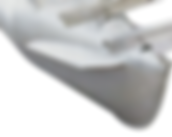Pontoon Tubes

Nose Cone
Baffle
Baffle
End Cap
Manufacturers have differing stories about the way their pontoons are constructed. How tubes are vented, the shape of the nose cone and spray shield, runners that protect the bottom, etc. While most pontoons are round there have been different shapes for decades, with unique performance claims. This is the general way that pontoon tubes are made. It hasn’t changed much from the original old steel pontoons.

U Shaped

Octagon Tube

Elliptical Tube


Sylvan Tapered Tubes
Larson
Round tubes are the most common probably because it’s the easiest to roll and form. Each shape has unique performance and carrying capacity and manufacturers' sales brochures explain each of the benefits.




19”
23”
25”
27”
The diameter of the pontoons has increased over the years. The larger the tube, the more weight it will carry. Older boats had 19” diameter, 21”, and then 23” diameter followed. Some modern boats have 25” and even 27”. We recommend boats with 23” diameter or larger for rebuilding. Smaller pontoons will limit furniture and accessory options.




The front of the pontoon that cuts through the water is called the nose cone. There are different ways of forming the nose cone. The sharper the bow the better it cuts through the water. Spray shields near the top help deflect water. Some spray shields are welded on “fins” while other styles have the spray shield formed into the top of the nose cone.




Modern high performance pontoons have lifting strakes welded to the bottom sides of the pontoon. Lifting strakes help the pontoon corner. Pontoon manufacturers have experimented with tubes of different sizes and shapes always trying to improve cornering. The idea is the more surface in the water, the better the pontoon will corner, not slide. Manitou Pontoon holds a patent on using a larger (deeper) center tube.

Unique shaped pontoon
Transducer bracket
Riser Bracket

Keel
Drain Plug
Lifting, Mooring or
Tie-Down eye
Deck Trim or
F Channel
(covers joint of deck trim)
Corner Cap
Transducer Brackets. Drain Plug. Many modern pontoons have a bracket welded to the bottom of the pontoon. This is to mount a depth finder or speedometer.
Many pontoons have a removable plug at the bottom of the tube. This is sometimes for pressure testing and handy for draining condensation from the tube. Most boaters never drain their tubes but condensation accumulates and it’s a good idea to drain it.
